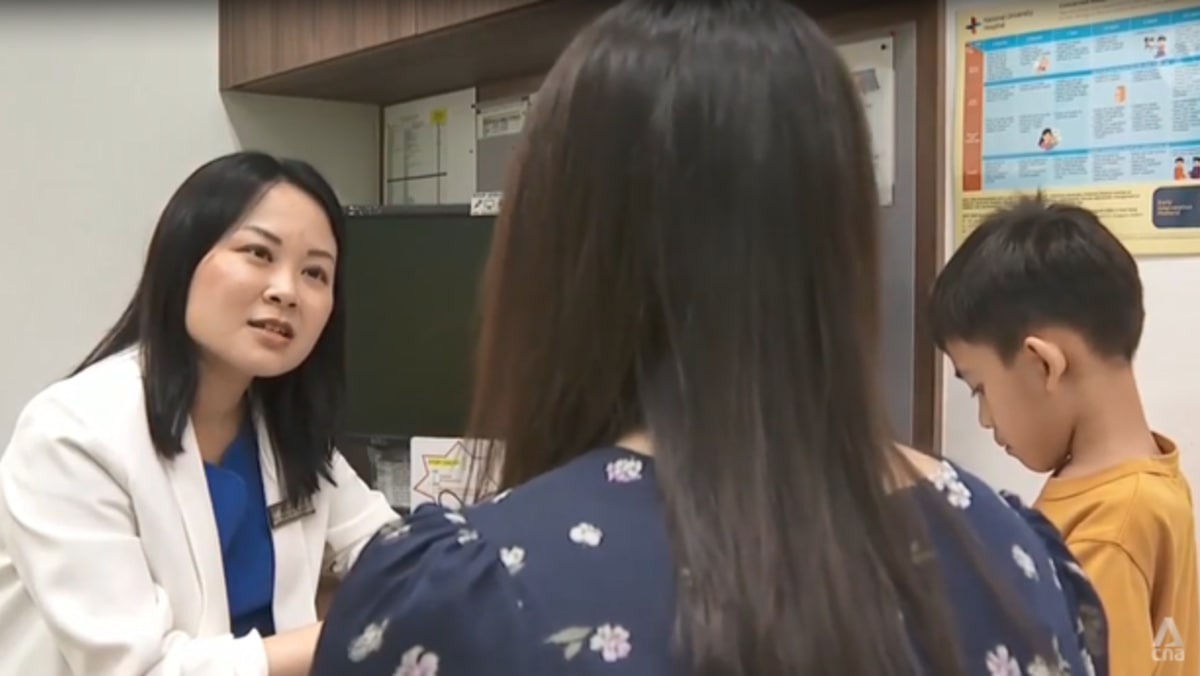Some polyclinics adopt autism screening tool to help early detection in toddlers The checklist aims to identify toddlers at risk of developmental delay at around 18 months old – much earlier than previously, and address these issues quickly. SINGAPORE: Some polyclinics in Singapore are adopting an international screening tool to help in the early detection of autism in young children in primary care settings. A new study, involving 5,336 toddlers between the ages of 17 months and 20 months, showed the tool is more than 80 per cent accurate in determining if a child could be on the spectrum. Early detection of the condition leads to intervention at a younger age, which is key to improving the effectiveness of treatment and overall quality of life, said doctors. CHECKLIST FOR SCREENING In the form of a questionnaire called the Modified Checklist for Autism in Toddlers, Revised with Follow-Up (M-Chat-R/F), the tool was assessed in polyclinics between August 2020 and November 2022. It consists of 20 observational questions for parents and caregivers, including asking if their child looks at an object that is being pointed at, plays make-believe, or mimics actions. Those who screen positive will be flagged for further tests with a paediatrician or psychiatrist to confirm an autism diagnosis. Dr Aishworiya Ramkumar, a paediatrics consultant who is the leading author of the study, said that many early signs of the condition are easily noticeable by caregivers. They include a child giving a poor response when their name is called or not using gestures like pointing. Currently, primary care physicians identify red flags, such as if a child avoids eye contact, during routine check-ups. However, this can be subjective and may require multiple rounds of such sessions to detect. Researchers of the study, led by the Child Development Unit at the National University Hospital’s (NUH) Khoo Teck Puat – National University Children’s Medical Institute (KTP-NUCMI), said the checklist acts as an additional, validated tool for physicians. “The questionnaire has a very clear scoring system to guide healthcare professionals as to what’s the next best course of action. This will complement our existing system of using red flags to screen our children,” said Dr Ruth Zheng, a senior consultant at National University Polyclinics (NUP). TOOL ALLOWS FOR EARLY DETECTION With one in 150 children on the autism spectrum in Singapore – higher than the global average of one in 160 – doctors said it is all the more important for early detection. A prior study that examined autism trends in the nation from 2016 to 2018 showed that the mean age of diagnosis was at 35.5 months of age, and the age of receiving intervention was 42 months. The M-Chat-R/F screening tool aims to identify toddlers at risk of such developmental delay much earlier, at around 18 months old. “Early signs of autism are present in a majority of children by 18 months of age, and many from 12 months,” said Dr Ramkumar. “So, the premise of this screening is to capture all of these early signs in a structured format, to make parents pause and reflect whether their child is showing signs of normal development, or if there’s anything to be concerned about.” EARLY DETECTION IS KEY Doctors said treatment is more effective at a younger age. “The golden period – which refers to the development of the brain between birth to about two or three years old – is when the brain is the most sensitive to receive any intervention,” Dr Ramkumar told CNA’s Singapore Tonight on Thursday (Mar 14). “So, if we can detect children who are on the spectrum at an earlier age, we can then start treatment for them earlier, and this can translate to better outcomes. The child would then grow up to have better communication and independent living skills later on.” In the study, approximately two per cent of children were screened positive, and among those who had further evaluation, 85.7 per cent were confirmed to have autism. Those identified with the condition received follow-up support and intervention to address their communication and behavioural difficulties. Madam Suhaila was one such parent who received help. Her son screened positive during his routine checkup at a polyclinic at 18 months old. He was sent for further evaluation by specialists at NUH and was diagnosed to be on the spectrum. She said that while the diagnosis was unexpected, the early detection helped both her and son deal with the condition as early as possible. “When the doctor assessed (my son), they found that he had speech delay, no eye contact, and also hyperactivity. The doctor told me he might have autism. I was devastated, I didn’t expect it,” she said. “He benefited from the early intervention as he started quite immediately with speech therapy, other classes, and doctor appointments. They taught me how to communicate with my child, how to encourage him to talk, and how to teach him to behave and control his emotions.” Dr Ramkumar cautioned that while the questionnaire is valuable for screening, a positive screen does not equate to an autism diagnosis, and a follow-up definitive assessment is necessary. The research team said further studies will be conducted to better understand the long-term outcomes of the tool, including the most appropriate age to screen. The checklist has been rolled out at seven polyclinics in the western part of Singapore as part of routine screening for children.
This content was originally published here.
